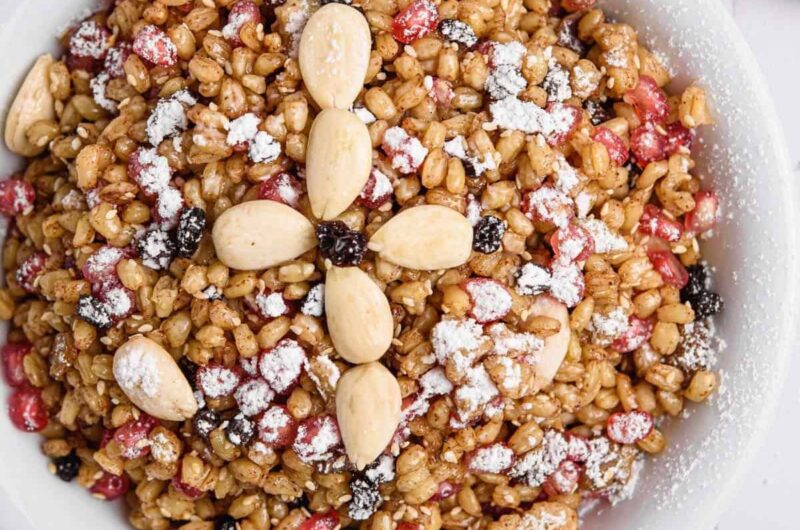Koliva Recipe
Koliva (also spelled Kolyva) is a traditional dish deeply rooted in Greek Orthodox and Eastern Orthodox Christian traditions. It’s most often prepared for memorial services (mnemosyna) as a way to honor loved ones who have passed. Made from boiled wheat berries mixed with nuts, seeds, dried fruits, sugar, and spices, koliva symbolizes both life and resurrection.
Although primarily served at religious services, koliva is also enjoyed for its rich flavors and nutritional value. If you’ve ever wanted to make this symbolic dish at home, this step-by-step koliva recipe will guide you through the process.
Traditional Koliva Recipe | Greek Orthodox Memorial Wheat Dish
12
servings20
minutes1
hour290
kcalIngredients
2 cups wheat berries (whole wheat kernels)
½ cup walnuts, chopped
½ cup almonds, chopped
½ cup raisins (or currants)
¼ cup sesame seeds, lightly toasted
¼ cup pomegranate seeds (optional, for garnish)
½ cup granulated sugar (or to taste)
1 tsp cinnamon powder
½ tsp ground cloves
½ cup plain breadcrumbs or ground graham crackers (for coating)
Powdered sugar, for dusting (optional)
Directions
- Cook the wheat: Rinse the wheat berries thoroughly, then boil in a large pot with plenty of water until tender (about 1 hour). Drain well.
- Dry the wheat: Spread the cooked wheat on a clean towel or baking sheet. Allow it to air-dry for at least 4 hours or overnight. This prevents excess moisture.
- Mix ingredients: In a large bowl, combine the wheat berries, walnuts, almonds, raisins, sesame seeds, sugar, cinnamon, and cloves. Mix well
- Assemble: Transfer to a serving dish. Smooth the top, then coat with breadcrumbs to absorb any remaining moisture.
- Decorate: Garnish with pomegranate seeds and dust with powdered sugar if desired.
- Serve: Traditionally served at memorials, but also enjoyed as a wholesome, sweet, and nutty dish.
🍽 Nutrition (per serving):
- Calories: ~290 kcal
- Fat: 12g
- Carbohydrates: 41g
- Protein: 6g
- Fiber: 5g
- Sugar: 18g
The Symbolism of Koliva
Koliva is more than just food it carries deep symbolism in Orthodox Christianity. The wheat kernels represent the cycle of life and resurrection, drawing inspiration from the biblical phrase: “Unless a grain of wheat falls into the ground and dies, it remains alone; but if it dies, it produces much grain” (John 12:24).
The sweetness of the raisins, sugar, and fruits reflects the hope of eternal life, while the nuts and seeds represent abundance.
For another Greek recipe rich in history,don’t miss visiting our website Fat Recipe, a dessert that combines layers of tradition with flavor.
Tips & Variations
- Flavor boost: Add orange zest or rose water for a fragrant twist.
- Simpler version: If pressed for time, reduce the number of nuts and fruits while keeping wheat, sugar, and cinnamon as the base.
- Healthier version: Replace granulated sugar with honey (though this is not traditional for memorial services).
- Decoration: For special occasions, some families decorate koliva with sugared almonds, Jordan almonds, or religious symbols created from powdered sugar.
Serving Suggestions
While koliva is primarily made for memorial services, many enjoy it as a hearty, wholesome snack or dessert. It pairs beautifully with a cup of Greek coffee or herbal tea.
If you’re interested in other Mediterranean staples, check out our Fat Recipe for a comforting and nourishing dish.
Frequently Asked Questions
1. Can koliva be made in advance?
Yes, you can prepare it a day ahead, but store it in the fridge and bring it to room temperature before serving.
2. Can I freeze koliva?
Freezing is not recommended, as the texture of the wheat berries changes significantly.
3. Is koliva always sweet?
Traditionally, yes it is sweetened with sugar, raisins, and fruits. However, savory variations do exist in some regions.
Final Thoughts
The koliva recipe is a beautiful blend of tradition, flavor, and symbolism. Whether you are making it for a religious ceremony or simply exploring Greek heritage dishes, koliva connects food with meaning in a deeply moving way.
For more cultural recipes with history, don’t miss visiting our website Fat Recipe a savory pie that’s just as symbolic of Greek cuisine.
